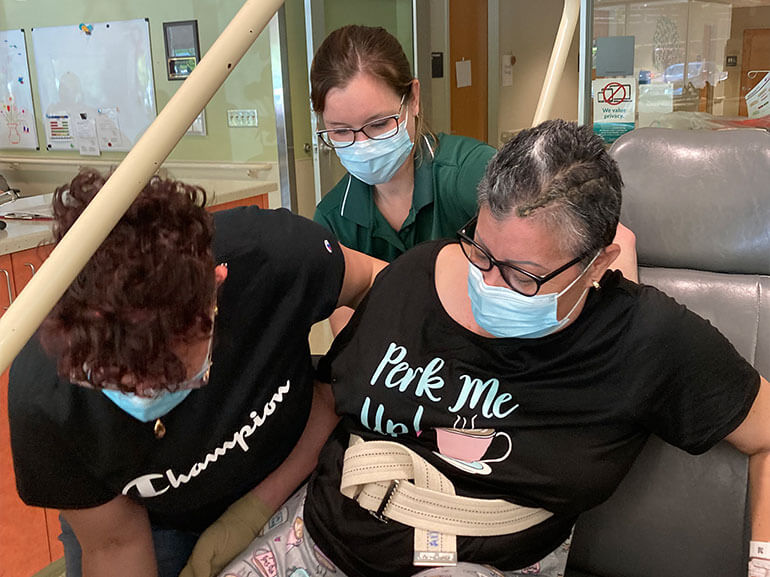Ana's story

Ana Torres-Soto, 54, worked full time cleaning offices in a large local health system. One day she felt off as she started her shift. Ana had a headache, felt lightheaded and her legs were weak after only cleaning for a short time. She was worried and went to the Emergency Room. To her surprise, she was told she was actively having a stroke. Ana was quickly treated per the hospital’s stroke protocol and received a clot-dissolving medicine. However, her brain began to swell, she was having difficulty breathing and was only able to squeeze a ball in response to yes/no questions. Ana spent two weeks in the Intensive Care Unit (ICU) but continued to decline. She developed further swelling and became unresponsive. Her physician discussed removing the blood clot causing her stroke by doing a craniotomy, a specialized kind of brain surgery, to decrease the pressure in Ana’s brain and improve her blood flow. Even with the intervention, her family was told that she would likely be bedridden after surgery.
Ana’s family decided to proceed with the surgery, and it was a success. One of Ana’s two brothers was visiting when she opened one eye. After a few days, she was able to open her other eye. As swelling diminished, she was moved out of the ICU. Initially Ana required a tracheostomy to help her breathe as well as a feeding tube for nutrition but after a few weeks, she was able to discontinue both.
Ana was then discharged to Helen M. Simpson Rehabilitation Hospital to continue her healing and recovery. She was adamant about getting stronger and regaining her skills, and with her daughter Jaimy’s daily support, she was going to make it happen.
The stroke team at Helen M. Simpson Rehabilitation Hospital created an individualized program to address Ana’s specific deficits including right-sided weakness and word finding difficulties. Her program included physical, occupational and speech therapy. Each therapy helped her relearn key motor activities such as walking, standing, lying down, switching from one movement to another and eating safely to reduce her risk of inhaling food into her lungs. Jaimy also participated in the hospital’s Care Partner Program to learn how to provide care and safely assist her mother at home.
To help with Ana’s right-sided neglect, Jaimy would stay on her right side for support. Jaimy had a notebook and encouraged her mother try to write and draw simple circles and lines. Ana started writing her name and playing simple games with her daughter.
Ana’s progression continued. She began to talk and sing, despite having aphasia which is the loss of ability to understand or express speech. Initially on a pureed diet, Ana advanced to a regular diet one week into her rehabilitation program. Ana recalled, “The hardest part of my recovery was dealing with my feeding tube. Once it was removed, I was so excited to eat two of my favorites—Chinese food and a Panera sandwich.”
During her sessions in the hospital’s vision program, the neuro optometrist directed Ana on therapeutic activities to improve her right-sided attention and she was able to start dressing independently. Jaimy described the impact, “The vision therapy was extremely helpful to my mother. She developed increased attention to her right side and her scanning improved.”
Due to her right-sided weakness, Ana experienced motor apraxia which is difficulty coordinating movements, such as reaching or taking a step. Her physical therapy team worked with her on this and when discharged from the program, Ana only needed minimal assistance from her daughter for mobility.
Jaimy said the family chose Helen M. Simpson Rehabilitation Hospital because of proximity and their confidence that the hospital’s specialized equipment would give her mother the best chance to return home. “My mother was very independent prior to experiencing her stroke. We are very close and love to explore new restaurants and other destinations together,” said Jaimy.
Ana was discharged home after 26 days. Ana and Jaimy were most excited to get back to spending time together and starting some new adventures.
When asked if Ana had any advice for others on the road to recovery, she said: “Never believe you cannot make it back, because you can!”